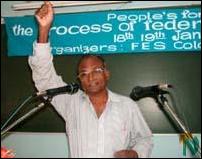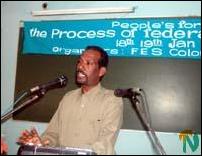'Federalism will unite divided Sri Lanka' – Jaffna don
[TamilNet, Sunday, 19 January 2003, 12:48 GMT]
“This country is already divided. This is the ground
reality. The Sinhalese people have to be told this.
There is no point in talking about history now. The
Indo-Lanka Accord, the Banda-Chelva Pact and the
Dudley Chelva Pact have recognized the separate
distinct identity of the Tamils in the past. The
Sinhalese have to be told that the divided country can
be united by granting a federal solution," said Prof.
S. K Sittampalam, a senior historian, speaking at a
seminar on ‘Federalizing the Sri Lankan State’ in the
University of Jaffna Sunday.
 |
|
Prof.S. K Sittampalam.
|
“We have the same claim to this island as do the
Sinhalese. The Tamils and Sinhalese are the common
inheritors of the civilization that appeared on the
island around 900 B.C," Prof. Sittampalam said.
Dr. Rohan Edirisingha, senior lecturer in law in the
University of Colombo, stressed the need for
understanding the nature of unitary and federal
systems and their basic features.
He said that there is a lot of ignorance among the
Sinhala people about the federal system of regional
autonomy and that much needs to be done to educate
them on the matter.
“Many of them think that it could be a stepping stone
to separation," Dr. Edirisingha said. He appealed for
greater dialogue between Tamil and Sinhala
intellectuals and opinion makers on the federalism
during his presentation on Saturday.
“The southern polity is not prepared to accept Sri
Lanka as a pluralist state. Therefore how do we ‘sell’
the idea of federalism to the (Sinhala) majority? Is
there enough to get out of this ghetto mentality and
accept Sri Lanka as a pluralist state?” asked Mr. V. T
Thamilmaran, senior lecturer in law in the university
of Colombo, in his presentation at the seminar Sunday.
 |
|
Mr. V. Thamilmaran, senior lecturer in law in the university of Colombo.
|
“Internal self-determination should guarantee a
judicial mechanism to ensure and uphold real self rule
and shared sovereignty. Otherwise a federal
constitution based on the principal of internal self
determination would be nothing more than a piece of
paper. It would have no more value in its application
than the paper on which it is written on," Mr.
Thamilmaran said.
“Internal self-determination should also guarantee
territorial identity and strike a balance between the
rights of individuals and the rights of a group,
providing for a bill of rights charter in which
special protection for the group should not be
construed as a violation of the principle of
equality," he added.
Mr. Thamilmaran pointed out that Articles 2, 3, 4, 75,
76 and 82 of the Sri Lankan constitution preclude the
possibility of setting up a constituent assembly to
draft a new constitution for Sri Lanka.
The two day seminar and workshop were supported by the
Fredrich Ebert Stiftung Foundation (Germany) in
Colombo.








